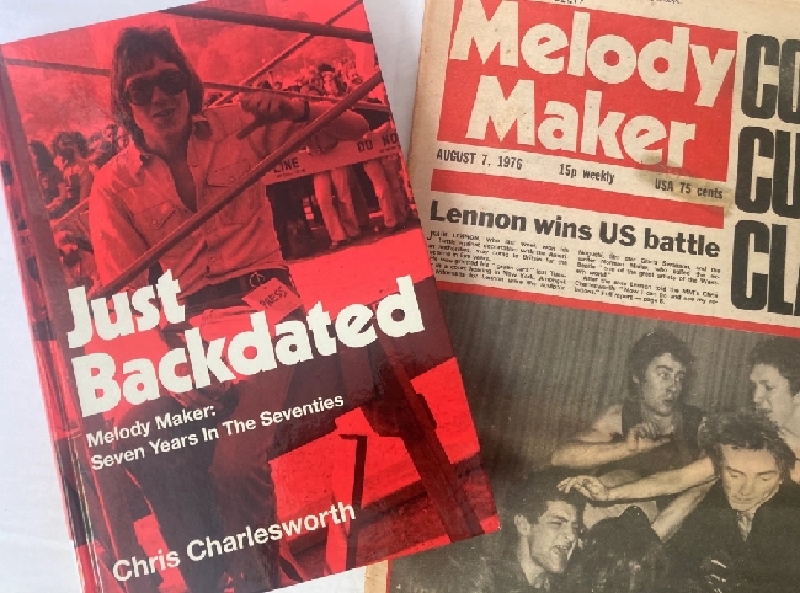
Who is Chris Charlesworth? Well, you may well have a few of his books in your overflowing rock book shelves; a couple on David Bowie, four on the Who, one apiece on Cat Stevens, Deep Purple, Slade, and Elvis. Go search Trove or Abebooks dot com and see what you can find.
In short, he is an acclaimed author, editor and interviewer. He was staff writer for UK music magazine Melody Maker in the ‘70s when it was arguably at the peak of its power. As its News Editor - and from 1973, US Editor, based in New York - he interviewed and/or wrote about just about every rock icon of the era.
Also, just so you know, Charlesworth edited the first book what I roat, about The Birthday Party, back in 1996. I met him for a drink in a storied Soho pub a couple years later (Omnibus Press' offices were in Frith Street) when I happened to be in London, and again when he toured Australia a few years after that.
More recently, off and on, I've been reading his Blogspot where he mulls memories and music old and new. One of the more enjoyable blogs.
Hand on heart, honest.
So I was rather looking forward to reading his book, “Just Backdated. Melody Maker: Seven Years in the Seventies” published by Spenwood Books Ltd. In fact, I went to my local music emporium (Streetlight Records, in Adelaide) and ordered a copy from the UK. And, I even paid for it. I had no real expectation; after all, most books dealing in the ‘60s and ‘70s pull punches to save the blushes of the (now) rich (and often litigious).
Charlesworth skates fairly close to the knuckle, but his story is told in entertaining, swiftly-moving prose and, never mind what you really think about the bands he sometimes refers to, you want to be there.
And then, you also might want to go for a trawl through the “Rock's Back Pages” website: certainly it costs money, but you get to download a perfect shed-load of stuff which you never knew you needed.
So. It isn't often that I put such an entertaining, relatively light-hearted memoir down with a sigh of relief, but I did this morning. Over the last day or so I'd been reading '”Just Backdated’” every chance I got, and quite frankly it's so chockas with free-wheeling rock stars, music, drugs and assignation that I felt quite drained toward the end.
Some books are roller-coasters of tightly-writ moments on fast-forward, but reading ‘Just Backdated’ is more like being whisked, cartwheeling, into a blizzard of carefully selected events.
I mean, it's a terrific read. It's just that Charlesworth crammed so very, very much into a bare seven years (1970-1977) working for the MM that it all but beggars belief.
Also, I suspect he left out rather a lot. But never mind that, because "that's another story". Now, not only does a copy of “Just Backdated” belong on your bookshelf, if there were any justice, HBO or Netflix would be rapping smartly on Charlesworth's door with a shapely contract in one hand, a case of French champers in the other and a Securicor’s van of wonga by the kerb.
Interestingly, “Just Backdated” is also a coming-of-age kind of story, though that's really a subtext. In terms of rock stars, which is what you're really here for are, admit it, the most notable offenders are: The Who, John Lennon, Deep Purple and Led Zep, and Elton John, up close and personal.
But let's go and see if we can tease a bit more out of this Chris Charlesworth bloke...
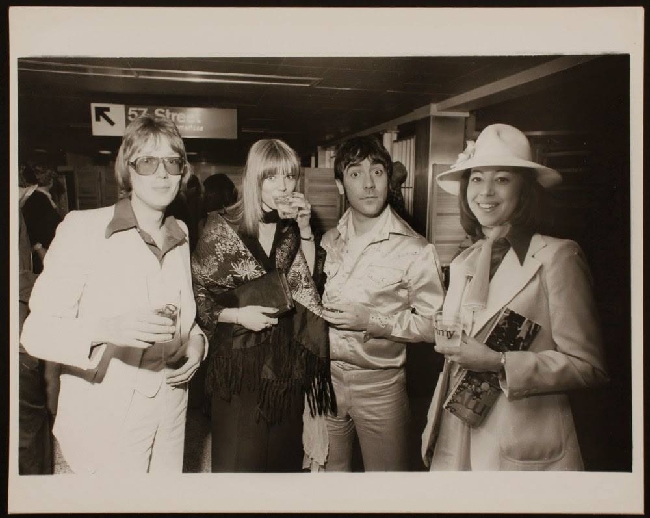 Chris Charlesworth (left) with Keith and Annette Moon (and Chris's date) at the premiere of “Tommy The Movie” in New York City, 1975.
Chris Charlesworth (left) with Keith and Annette Moon (and Chris's date) at the premiere of “Tommy The Movie” in New York City, 1975.
RB: How did your education differ to what kids are taught today?
CC: I was partially educated at what we in the UK call a ‘public’ school which was actually a fee-paying private boarding school where I was a bit of a rebel. I was caught breaking all sorts of rules (smoking, drinking, associating with girls, modifying the school uniform) and asked to leave. It differed from what kids are taught today in that it was ‘old school’, all academic, not much arts, but the facilities were good and class sizes small. There was an overemphasis on sport (unlike state schools). I was 17 when the headmaster told my mum and dad he didn’t want me in the school any longer, so I didn’t stay for A levels which, had I passed, would have entitled me to go to a university. I wasn’t bothered and neither were my mum and dad.
RB: You started out in Skipton's local weekly newspaper, 'Craven Herald & Pioneer' in 1964; what made you decide to apply?
CC: I thought being a newspaper reporter would be an interesting job. You didn’t need much in the way of qualifications, which I didn’t have anyway. I had English Language and Literature at O level which was all that was required. You learned on the job really, though I did go on a journalists’ training course, as outlined in my book. I was right. It was an interesting job and I got to know many people in my home town, some of whom are friends today. I learned the basic tools of the trade of journalism which stood me in good stead no matter what I specialised in.
RB: Your first gig was the Beatles, with a horde of screaming fans. Whose screaming fans were the loudest, Beatles, Osmonds, Jackson 5, Bay City Rollers ...?
CC: Hard to say at 50+ years remove but I think The Beatles because their set was shorter. Also, the idea of girls screaming at pop stars was new in the UK, hadn’t happened before. They screamed at the Stones too. In the US the Monkees were invented to take advantage of the same situation. There was a screaming hiatus for about five years until the arrival of the Osmonds and Jackson 5 which started it off again, followed by the Bay City Rollers. Only the Beatles and Stones (and Michael from the J5) managed to sustain careers after the screaming stopped.
RB: Come to that, what on earth created such hysteria in the first place? it seemed to die down after a while, too. Just how strange a phenomena was it?
CC: Sex! Above and beyond their music, The Beatles were physically attractive to young girls. They looked different (hair, clothes, smiles) from most other boys/men, and were very attractive. The hysteria didn’t die down during the Beatles’ performing career. Even at their last show (San Francisco, 1966) girls were screaming their heads off. They were so fed up with not being heard that they stopped touring, that and the security risks after John’s “bigger than Jesus” comment.
RB: Were there any gigs at which you were frightened, either by the behaviour of the crowd or the band, or their roadcrew?
CC: I was frightened at the Bay City Rollers riot in Boston Airport (see book) and Led Zeppelin’s crew were very intimidating. No musicians scared me though some were uncooperative (Sly Stone, Neil Diamond, see book). There was a thug called Wilf Pine (now dead) who worked for Black Sabbath and he was pretty scary.
RB: There's no fat in the book, yet it's utterly jammed with material. Just how hard was it to winnow it all down?
CC: Not too hard. I made a point of including all the stories I could about the biggest acts – Lennon, McCartney, Dylan, Bowie, The Who, Led Zep, Springsteen etc. I was lucky insofar as I was given scans of every Melody Maker from the ‘70s, so I could go through them page by page, making a note of all that I wrote, then whittling it down to the big names and those lesser ones that I thought were interesting. I could have written twice as much if I’d included everyone.
RB: It seems that your move from newspaper journalism to music journalism was a significant sea change - could you elaborate on the differences ...?
CC: Melody Maker was far less regimented that the regular newspapers. Within reason, we came and went as we pleased and no one cared about office hours so long as we wrote all we had to write in time for the following week’s paper. This was especially true in the US where I worked alone. Also, you could dress how you liked on MM, grow your hair, be free from the constraints of everyday life.
RB: Could you explain just why the USA was so preferable a place than Britain in the 1970s? I loved your Brit vs USA sandwich comparison... the way in which such simple things express vast gulfs of attitude.
CC: The US was more forward-looking and people there (that I met) were far more open minded. Also, I was my own man there, free to live and behave as I wanted, no one telling me what to do. Any British kid who loved rock and pop music felt that America was the promised land, the land of Elvis and Chuck and Jerry Lee and Buddy Holly – all the great rock stars. I was SO happy to go there the first time, and working there for four years was a dream job, especially as all my expenses were taken care of my MM’s owners. I could buy cheap grass easily there, and the girls were more welcoming, if that’s the right word.
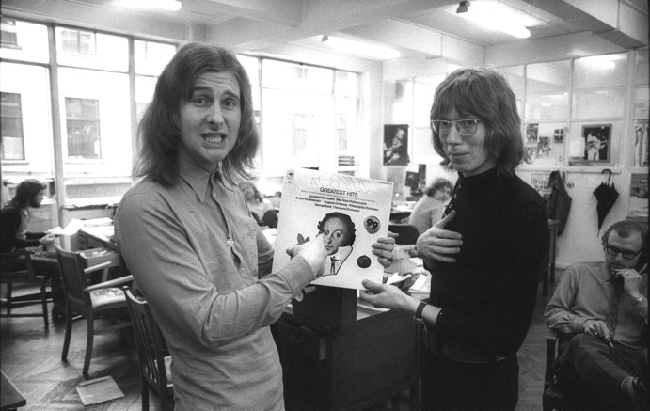 With Melody Maker colleague Roy Hollingworth (left).
With Melody Maker colleague Roy Hollingworth (left).
RB: On the surface, your life between 1970 and 1977 resembles that of a millionaire playboy, but you had to work to maintain that lifestyle. Just how hard was it?
CC: Looking through those scans I was given I was amazed at how much I wrote, or how hard I worked. Usually two interviews a week, plus a couple of show reviews, and a New York news column, week in, week out. I really did churn it out, and some of the features/interviews were pretty long, like over 3,000 words. Still, I didn’t mind. It was better than a nine-to-five job, and I was seeing all these rock shows all the time for free.
Although I didn’t mention it in the book, the reason why the bloke who was sent to replace me in mid-1975 was recalled after four months was because he was a lazy bugger who simply didn’t do much work. Unlike me, he didn’t relish living in NY and wasn’t a self-motivator. Also, he was a jazz fan who didn’t much like rock and invariably put it down, which is all very well once or twice but as an editorial principle wasn't right for MM.
RB: You wrote a vast amount over the years, in particular with the Melody Maker. Could you explain a little more about the nature of putting together either an interview or feature piece on a band at the time. It wasn't simply sitting at a computer and pulling things off the internet, so how did you manage it?
CC: I bought Billboard (US music trade paper) every week and scanned the single and album charts. If there was a new name I’d get on to the record label and fix up an interview. Most of the stories about the big names were sort of obvious things for me to cover. Sometimes Ray Coleman (editor in London) would call and tell me to get an interview with someone or other, most times it was on my own initiative. After a while I just had a feel for what was needed. There were no research tools beyond whatever bio might be provided by the record label, or the records themselves. Usually I’d write out a list of questions than I intended to ask but often the interview would go off at tangents, not a bad thing. Some musicians were more talkative and interesting than others (Bowie, Lennon, Townshend), others a bit dull.
RB: Popular culture accepted many things back then which we would find outrageous today. What things stick out today as being poor behaviour, but was commonplace then?
CC: I think girls – potential groupies – were treated a bit shabbily. Those girls who hung out with bands backstage or at various clubs definitely wanted to sleep with the musicians but some musicians were dismissive of them.
RB: Part of the culture you were in was a massive gravy train - was the origin of this splendiferous spending ever explained to you?
CC: No, we just took it for granted that record companies would lavish money on us for travel, food, drink etc.
RB: Ian Hunter once expressed the view that a music writer existed purely to make the musicians look good; was that a prevailing view, or one that was gradually shifting?
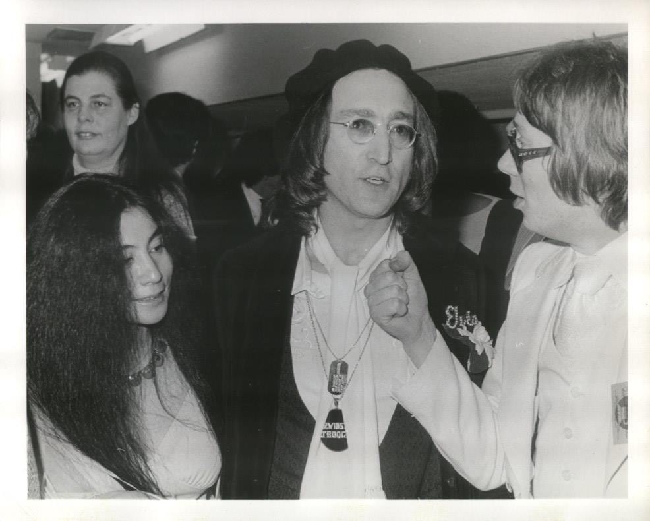 Hob nobbing with the Lennons. Bob Gruen photo.
Hob nobbing with the Lennons. Bob Gruen photo.
CC: I think it might have been a prevailing view, as you put it, but on the whole we were fairly benign towards the rock stars we interviewed. Hunter lost his rag because I’d exposed him (and/or his PR) for lying about why those Hunter-Ronson dates were cancelled, which is why I made that comment.
RB: What's the worst example of rock star extravagance you ever saw...?
CC: Led Zeppelin’s plane trip to LA just so Jimmy Page could shag an underage girl (see chapter 24 in book).
RB: When I read of your home visits after months of fast-paced, high-living, tape-transcribing, frantic typing and deadline-meeting ... just how pronounced was the contrast of these two lives?
CC: Different worlds. Back home there was no way I could convey to my old friends (or Dad) what I’d been up to, so I didn’t bother. Truth be told, after a week I was bored and gagging to get back to my MM world.
RB: Rowland S. Howard once remarked to me that the music industry was the most feudal in the world... what do you think?
CC: Bands who’d yet to make it were certainly treated like serfs by the record labels, and were in debt to them in much the same way as croft holders in the Middle Ages. Still, I wasn’t really aware of this until much later, after I’d left MM and realised how the business worked. It wasn’t something we wrote about and, as in the Mott The Hoople instance, I didn’t convey to MM readers that they lived in a pigsty. At the other end of the scale, we did convey to readers that the rich ones lived in Manor houses, like Roger Daltrey whom I later learned loathed being referred to as the Lord of the Manor.
RB: Looking back, the ‘70s seem to be awash with assorted idealists, cults and gurus. Some even appear to have been genuine ... could you explain what it was like to be a fish in that ocean, and how you avoided being had for lunch?
CC: The only times I was ever approached by anyone seeking to get me to join a cult (and relieve me of my savings, no doubt) were the woman at Chicago Airport that I refer to in the book. One time a Moonie approached me on the street in New York near where I lived and I was spectacularly rude to her, suggesting we head inside for a fuck. It was the only way to get rid of them as they were chillingly persistent.
RB: Christianity seemed to be experiencing a second coming (as it were) from the 1960s into the 1970s... what do you think drove this, and why on earth did it continue?
CC: Did it? I never noticed it. I had zero interaction with any kind of traditional religion, never discussed it with musicians during interviews, don’t think I even went inside a church once while I lived in the US. I avoided the Bible Belt states too, not deliberately, just never went there.
(As an aside here I should perhaps point out that I long ago concluded that all religion is superstitious bollocks practised by those who enjoy imposing their will on others.)
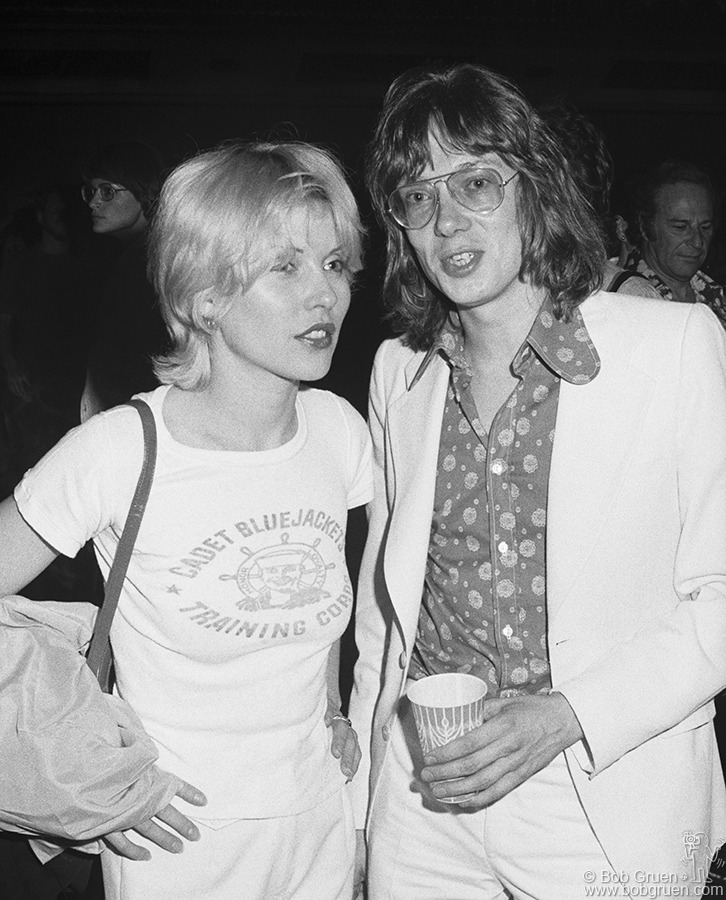 With Debbie Harry. Bob Gruen photo.
With Debbie Harry. Bob Gruen photo.
RB: I wonder if you could expand on your experiences at CBGBs, Max's, and perhaps with the Dictators... (I know I'm really asking for another book here, but ...)
CC: The Dictators (and the Ramones) were punk before I knew what punk was. The Dictators were really loud, intimidating, hard core, challenging the audience to hate them I think. The Ramones were more fun. But not all the groups at Max’s or CBGB were like that. Some were more traditional, melodic bands. It’s just that the punks/new wavers gravitated to CBGB so the venue got a reputation for that kind of music.
RB: Could you elaborate on the appeal of Leon Redbone?
CC: I liked him because he was an enigma, playing a role, and the music he played was so out of the fashion that it appealed to me. He really was like someone from another time, the 1920s or so, and he played the part to perfection.
RB: Your 'meeting the Beatles' stories I found very moving; you seem to have been in complete awe of them, yet you were able to have actual normal conversations with Paul and John. Could you explain (for our rabid Stones fans, and the youngsters who read this) just why the Beatles were so important at the time?
CC: Until the Beatles UK pop/rock was crap, a pale imitation of American rock’n’roll acts. The Beatles were the first UK act to set the world on fire. In 1963 they were like the Royal Family, on the front pages of newspapers every day, causing chaos everywhere. It was like someone had switched the light on at last.
The Beatles opened a door and they all rushed through, the Stones, Who, Yardbirds, everyone really. I was 16 in 1963, the perfect age, and the impact The Beatles had on teenagers like me was like the beginning a new world for us. At last… something of our own, all for us. It was more than the music, it was attitude and though they hadn’t intended to do it, the Beatles led the charge into the swinging sixties.
I was in awe of them but by the time I was 23, the age I joined MM, I was a bit more mature and able to hold myself in check. Meeting pop stars was my job now and I very quickly stopped having stars in my eyes when I met them. Still, I had to pinch myself after that night I met Lennon.
RB: The way you describe things, you were well-provided for in terms of food, accommodation, drink and so forth. When you were in the presence for an interview or to do a live review, you don't seem to have wanted a piece of anyone other than what you were there to do. Your John Lennon memory - when you realised (perhaps after some confusion) that John might have considered you a friend - I found particularly moving ... I wonder, has it occurred to you that quite a few of the other rock stars also appear to have considered you a friend? Robert Plant, for example, or Keith Moon?
CC: I think the “friendship” was conditional of my being a friendly journalist. Had I slagged them off they would not have been so sociable towards me. Of the groups I befriended, only a few remained friends after I left MM – John Entwistle, Jim Lea and Roger Glover, all bass players oddly enough, and Townshend to a certain extent. But I retained the Who connection by working on their archive releases during the 1990s.
The last time I saw Robert Plant he didn’t know who I was. And Elton John ignored my request to endorse my book.
RB: I wonder - what you thought of your first encounter with Kraftwerk?
CC: I never had an encounter with Kraftwerk. They’re not in the book.
RB: Ditto Iggy and the Stooges?
CC: I only met Iggy once, when I did that interview in LA that I describe in the book. He was a very amiable and intelligent young man.
RB: Did you ever encounter Suicide?
CC: No. I think they were active when I was in NY, but I never saw them.
RB: 1970-1977: Ten favourite bootleg LPs?
CC: I don’t think I have ten favourites but FYI…
It is important to differentiate between bootlegs (often live recordings made by fans at concerts), pirate records (copies of legitimate records sold at a discount) and what I would call ‘unofficial’ records (material held by the artist but not made available to the public).
I have dozens of Who records from all three categories, mostly CDs but some vinyl. The best are the unofficial ones I got when working for them, and it’s mostly live recordings on CD from the soundboard at shows between 1968 and 1975. Some are fantastic, as good as “Live At Leeds”, albeit unedited. I have some really weird ones – the Stones and Who on one vinyl LP – and a collection of rare Who material compiled by US fans who wanted all these songs on one place.
Over the years some of this stuff has been made available officially. For a while I was part of a group of ultra-keen Who fans worldwide who swopped this stuff among themselves and for their benefit I wrote about what are probably the two best ones: “The Who in Ottawa”. And one from Amsterdam,
“Who’s Next” was recorded at Olympic Studios in Barnes and some master tapes were chucked into a skip after Virgin bought the studios in 1987 and did a refurbishment. Alerted to what was going on, an enterprising bootlegger found them and various boots made from the tapes found their way onto the market.
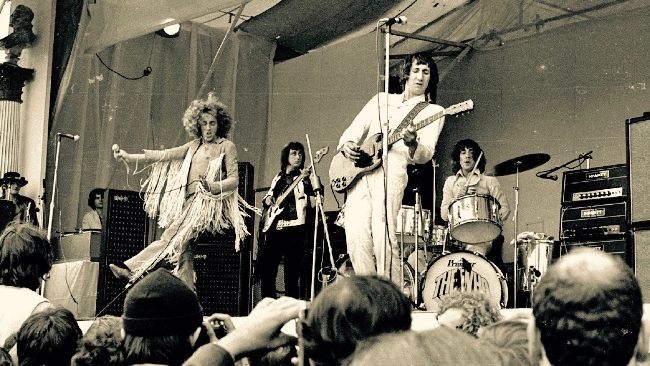 The Who.
The Who.
When I was working on the upgraded edition of “Who’s Next” in 2003 I managed to trace these master tapes and return them to The Who (for a price they paid). I knew a bloke who was a big cheese in the bootleg world and he helped me, no names of course.
Before all this I got loads of boots from that shop on Chancery Lane (see the book). Among the first I got was “The Beatles Live At Shea Stadium” which I used to play at parties to see how it went down, this being before any live material from the Beatles had been officially released. The compere yelled “Here they are … The Beatles” at the start and this used to wake people up. “What the f…” Only later did I discover that it was actually recorded at the Hollywood Bowl, as it was identical to the official “Beatles At Hollywood Bowl” LP that came out in 1977 (and is now a remastered CD).
That shop stopped dealing in boots after the visit from Led Zep’s management.
RB: 1970-1977: Best gigs you saw ...?
CC: About a dozen of the 29 Who gigs I saw remain etched in my memory as simply great moments, but the ones in Philadelphia and Jacksonville stand out.
Other than that I’d go for:
- Little Feat (in Washington DC)
- Springsteen (at Bottom Line and several shows after I left MM)
- Dylan (at the Garden and Rolling Thunder)
- Bowie (on Station to Station tour)
- Led Zep (in Montreux)
- Paul Simon (at Royal Albert Hall)
- Slade (Earls Court)
- Beach Boys (Anaheim)
- The Band (in NY)
- Ramones (Bottom Line)
RB: 1970-1977: Top ten Motown bands?
CC:
- Four Tops
- Temptations
- Marvin Gaye (though I actually prefer Al Green)
- Martha & The Vandellas (“Dancing In The Street” is my all-time fave Motown song)
- Miracles
- Supremes
RB: 1970-1977: Which ten people do you wish you'd interviewed?
CC:
- Elvis
- Dylan
- George Harrison
- Bob Marley
- Jerry Garcia
- Keith Richards
- Joni Mitchell
I’d loved to have chatted with Buddy Holly and Eddie Cochran but they died before I was on MM.
Also Peter Cook (funniest man that ever lived).
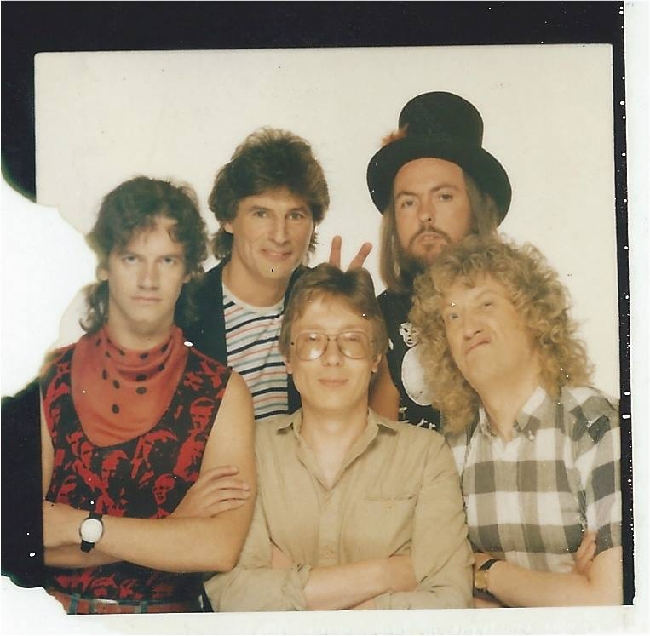 With his mates from Slade.
With his mates from Slade.
RB: 1970-1977: Which interviewees do you wish had been a bit more forthcoming?
CC: Steve Winwood. He was distracted when I spoke to him and I’d just started on MM and didn’t really know what to ask him. Sly Stone was incredibly unforthcoming (see the book). I wondered why he’d bothered to do the interview in the first place.
RB: Just curious... favourite Velvet Underground song?
CC: “All Tomorrow’s Parties”.
RB: Favourite John Cale song?
CC: “I Keep A Close Watch”.
RB: Favourite Lou Reed song?
CC: “Pale Blue Eyes”. (Strictly Velvets, I know, but it’s him really. You probably wanted me to answer “Metal Machine Music”…) I really like that “Songs For Drella” LP that Cale and Lou Reed.
RB: How much of the hippy idealism was a gimmick, do you think? and, ditto virtuous political romanticism?
CC: I don’t think it was a gimmick, not at first anyway. Others may have jumped on the bandwagon later. I think that in 1967/8 plenty of young people really did that think that love would change the world, incredibly naïve I know but they meant well. They simply didn’t reckon with the forces of capitalism who had too much to lose by their utopian ideals.
If by political romanticism you mean Lennon-style revolt, I think John felt he was on the side of righteousness. Again, those rock stars that supported leftish politics meant well. It is still ultra-uncool to ever admit to supporting the Conservative (right wing) party.
RB: You discuss sexual attitudes quite late in the book, yet the subject (ahem) “arose” many times earlier. Why did you put that discussion there, and not earlier?
CC: As it happens I sent a rough draft of the book to my ex-MM colleague and great friend Michael Watts and he said it needed more sex, so I added some of that at various points in the book. I added that bit at the start of chapter 26 because I felt it fitted well there, just before I was recalled to the UK for a spell.
Everything I said was 100 percent true and I could have added more but I felt that was enough. It was an odd situation, knowing that if I established a strong romantic relationship and was recalled without much notice I’d have had to make a tough decision – her or the job.
RB: The Sex Pistols appeared on the Grundy Show on 1st December 1976. What reaction did you see?
CC: That happened when I was in the US. There was a good deal of ribald laughter among music critics at the name Sex Pistols, also Buzzcocks.
RB: You resigned from Melody Maker in January 1977. The world was changing, and it was time to move on. Can you explain what led to that decision?
CC: Largely because I didn’t want to leave New York which I had made my home. I just felt it would be a comedown to go back to the UK. I figured I might not fit in any longer.
RB: And, since you only allude to the next few years ... what then?
CC: You want Volume 2? I stayed in NY, worked for Sir Productions run by my pal Peer Rudge who managed Lynyrd Skynyrd, looked after the Who’s US affairs and tour-managed the Stones. Peer also managed three other “small” acts that I helped manage. I tour-managed them, too. I want to learn about rock management.
Then the Lynyrd Skynyrd plane crash happened. Sir went bust. I came back to the UK, got a job at RCA records (doing Bowie’s PR amongst other stuff), then quit and started writing books, some for Omnibus who in 1983 offered me the job as editor. I stayed there until I retired.
RB: What do you think the big music/ cultural changes have been over the last 50 years?
CC: That’s a big subject but I sort of preferred it as it was when I was on MM. It seems to me that that in the 20 years or so after The Beatles the artists wrestled back control of the industry but with the advent of CDs the labels and managed gradually got it back where it has remained ever since.
The amalgamation of indie labels under the majors and the domination of the concert scene by Live Nation is part of this. Simultaneously, of course, the whole music world is now just part of the gigantic leisure industry. It wasn’t when Elvis recorded “That’s All Right”. It wasn’t when Beatlemania ruled and it wasn’t when Led Zep toured the world. Now it is.
This change is epitomised by TV talent shows which I loathe, and bland boy bands cynically assembled to appeal to pubescent girls. A pox on them. And of that makes me sounds like a grumpy old man, so be it.
RB: In 2024, how do you become a rock star?
CC: By being lucky! It’s a lot harder than it used to be. Perseverance.
RB: That said, is it worth it in the current climate?
CC: No.
RB: Whatever happened to all the big rock crowds? Especially in the pubs?
CC: The pubs and clubs closed. Not enough money to pay the bands. Neighbours complain about the noise.
RB: Lately, the UK seems to be selecting their PMs from the 'reduced' bin at the greengrocers ... or am I being unduly cynical?
CC: Ah, Prime Ministers ... a sudden lurch into politics ... Yes, indeed. The last three Tory Prime Ministers were indeed bargain basement: Johnson was a mini-Trump, a lascivious liar, self-obsessed bungler; Truss was as thick as a brick; and Sunak dealt badly with a losing hand. We can only hope for better from Starmer.
I’m not sure what you mean by PMs. However, I still buy old CDs for £2-3 from used record & charity shops. I’m genetically unable to pass one without looking, ditto guitar shops.
RB: Lastly, what advice would you give someone who wants to write a book about a rock band/ rock star?
CC: Do one on a cult act not previously the subject of a biography. If the act is controversial, so much the better.
'”Just Backdated. Melody Maker: Seven Years in the Seventies” by Chris Charlesworth is out now and published by Spenwood Books Ltd.

